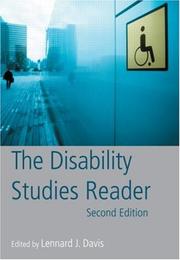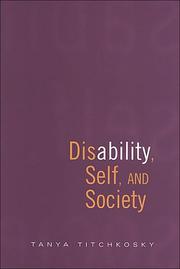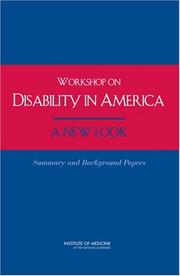| Listing 1 - 10 of 22 | << page >> |
Sort by
|
Book
ISBN: 1452265208 1412950511 1849725616 1412927137 Year: 2006 Publisher: Thousand Oaks, Calif. : Sage Publications,
Abstract | Keywords | Export | Availability | Bookmark
 Loading...
Loading...Choose an application
- Reference Manager
- EndNote
- RefWorks (Direct export to RefWorks)
This five-volume set attempts to define the many components of disability, from the medical, psychological, economic technological, cultural, sociological, policy and legal perspectives.
People with disabilities --- Sociology of disability --- Disability studies

ISBN: 9780415953344 0415953340 Year: 2006 Publisher: New York : Routledge,
Abstract | Keywords | Export | Availability | Bookmark
 Loading...
Loading...Choose an application
- Reference Manager
- EndNote
- RefWorks (Direct export to RefWorks)
People with disabilities. --- Sociology of disability. --- Disability studies. --- Handicapés --- Handicap --- Etudes sur le handicap --- Aspect sociologique
Book
ISBN: 0398084505 9780398084509 Year: 2006 Publisher: Springfield, Ill. Charles C Thomas
Abstract | Keywords | Export | Availability | Bookmark
 Loading...
Loading...Choose an application
- Reference Manager
- EndNote
- RefWorks (Direct export to RefWorks)
This updated and expanded new edition continues the theme of the first edition of emphasizing the struggles in which persons with disabilities have engaged, the barriers they have had to overcome, and the barriers they continue to face in their quest to obtain freedom. A major point is that disabilities are a part of life and everyone has limitations, therefore, persons with disabilities should be treated the same as any other human. The disability rights movement and its role in placing the demands of persons with disabilities before American society are discussed. Legislative action that imp

ISBN: 1281996076 9786611996079 1442673931 9781442673939 0802035612 0802084370 9780802035615 9780802084378 Year: 2006 Publisher: Toronto, Ont. University of Toronto Press
Abstract | Keywords | Export | Availability | Bookmark
 Loading...
Loading...Choose an application
- Reference Manager
- EndNote
- RefWorks (Direct export to RefWorks)
"Disability, Self, and Society speaks with authenticity about disability as a process of identity formation within a culture that has done a great deal to de-emphasize the complexity of disability experience. Unlike many who hold the conventional sociological view of disability as a 'lack' or stigmatized identity, Tanya Titchkosky approaches disability as an agentive (not passive) embodiment of liminality and as a demonstration of socially valuable in-between-ness. She argues that disability can and should be a 'teacher' to, and about, non-disabled or 'temporarily abled' society, hence, the vital necessity that disability stays with us."--Jacket
Sociology of disability. --- People with disabilities. --- Disabilities --- Sociology of disablement --- Sociology of impairment --- People with disabilities --- Cripples --- Disabled --- Disabled people --- Disabled persons --- Handicapped --- Handicapped people --- Individuals with disabilities --- People with physical disabilities --- Persons with disabilities --- Physically challenged people --- Physically disabled people --- Physically handicapped --- Persons --- Sociology of disability --- Sociological aspects --- Social policy and particular groups --- Social medicine
Book
ISBN: 1429455810 9211204801 9781429455817 Year: 2006 Publisher: New York United Nations
Abstract | Keywords | Export | Availability | Bookmark
 Loading...
Loading...Choose an application
- Reference Manager
- EndNote
- RefWorks (Direct export to RefWorks)
People with disabilities --- Cripples --- Disabled --- Disabled people --- Disabled persons --- Handicapped --- Handicapped people --- Individuals with disabilities --- People with physical disabilities --- Persons with disabilities --- Physically challenged people --- Physically disabled people --- Physically handicapped --- Persons --- Disabilities --- Sociology of disability

ISBN: 0415360986 Year: 2006 Publisher: New York (N.Y.) : Routledge,
Abstract | Keywords | Export | Availability | Bookmark
 Loading...
Loading...Choose an application
- Reference Manager
- EndNote
- RefWorks (Direct export to RefWorks)
Abnormalities --- Abnormalities, Human --- Disabled Persons --- Health Knowledge, Attitudes, Practice. --- History, Early Modern 1451-1600. --- History, Modern 1601-. --- People with disabilities --- Social Perception. --- Social history. --- Sociology of disability --- history. --- Social aspects. --- history. --- History. --- History.
Book
ISBN: 0814761097 0814759866 1435600398 Year: 2006 Publisher: New York : New York University Press,
Abstract | Keywords | Export | Availability | Bookmark
 Loading...
Loading...Choose an application
- Reference Manager
- EndNote
- RefWorks (Direct export to RefWorks)
Crip Theory attends to the contemporary cultures of disability and queerness that are coming out all over. Both disability studies and queer theory are centrally concerned with how bodies, pleasures, and identities are represented as "normal" or as abject, but Crip Theory is the first book to analyze thoroughly the ways in which these interdisciplinary fields inform each other. Drawing on feminist theory, African American and Latino/a cultural theories, composition studies, film and television studies, and theories of globalization and counter-globalization, Robert McRuer articulates the central concerns of crip theory and considers how such a critical perspective might impact cultural and historical inquiry in the humanities. Crip Theory puts forward readings of the Sharon Kowalski story, the performance art of Bob Flanagan, and the journals of Gary Fisher, as well as critiques of the domesticated queerness and disability marketed by the Millennium March, or Bravo TV's Queer Eye for the Straight Guy. McRuer examines how dominant and marginal bodily and sexual identities are composed, and considers the vibrant ways that disability and queerness unsettle and re-write those identities in order to insist that another world is possible.
Sociology of disability. --- Homosexuality --- Heterosexuality --- Marginality, Social. --- Culture. --- Queer theory. --- Social aspects. --- Both. --- Crip. --- Theory. --- abject. --- analyze. --- bodies. --- book. --- centrally. --- concerned. --- disability. --- each. --- fields. --- first. --- identities. --- inform. --- interdisciplinary. --- normal. --- other. --- pleasures. --- queer. --- represented. --- studies. --- these. --- thoroughly. --- ways. --- which. --- with.
Book
ISBN: 2130553699 9782130553694 Year: 2006 Publisher: Paris : Presses universitaires de France,
Abstract | Keywords | Export | Availability | Bookmark
 Loading...
Loading...Choose an application
- Reference Manager
- EndNote
- RefWorks (Direct export to RefWorks)
People with disabilities --- Disabilities --- Sociology of disability --- Handicapés --- Handicap --- Government policy --- Congresses --- Economic conditions --- Economic aspects --- Politique gouvernementale --- Congrès --- Conditions économiques --- Aspect économique --- Aspect sociologique --- Employment --- Social conditions --- Handicapés --- Congrès --- Conditions économiques --- Aspect économique --- People with disabilities - Employment - France - Congresses --- People with disabilities - France - Social conditions - Congresses --- People with disabilities - France - Economic conditions - Congresses

ISBN: 1281737658 9786611737658 9264026320 9264026312 Year: 2006 Publisher: Paris : OECD,
Abstract | Keywords | Export | Availability | Bookmark
 Loading...
Loading...Choose an application
- Reference Manager
- EndNote
- RefWorks (Direct export to RefWorks)
Why is it that health is improving, yet more and more people of working age end up out of the workforce relying on long-term sickness and disability benefits? This first report in a new OECD series on sickness, disability and work explores the possible factors behind this paradox. It looks specifically at the cases of Norway, Poland and Switzerland, and highlights the role of institutions and policies. A range of reform recommendations is put forward.
Chronically ill. --- People with disabilities. --- Business & Economics --- Labor & Workers' Economics --- People with disabilities --- Chronically ill --- Employment --- Government policy --- Chronic diseases --- Cripples --- Disabled --- Disabled people --- Disabled persons --- Handicapped --- Handicapped people --- Individuals with disabilities --- People with physical disabilities --- Persons with disabilities --- Physically challenged people --- Physically disabled people --- Physically handicapped --- Patients --- Sick --- Persons --- Disabilities --- Sociology of disability --- Norway --- Poland --- Switzerland

ISBN: 1280349344 9786610349340 0309656400 9780309656405 0309100909 9780309100908 0309164745 Year: 2006 Publisher: Washington, D.C. National Academies Press
Abstract | Keywords | Export | Availability | Bookmark
 Loading...
Loading...Choose an application
- Reference Manager
- EndNote
- RefWorks (Direct export to RefWorks)
People with disabilities --- Disabilities --- Health promotion --- Health promotion programs --- Health promotion services --- Promotion of health --- Wellness programs --- Preventive health services --- Health education --- Cripples --- Disabled --- Disabled people --- Disabled persons --- Handicapped --- Handicapped people --- Individuals with disabilities --- People with physical disabilities --- Persons with disabilities --- Physically challenged people --- Physically disabled people --- Physically handicapped --- Persons --- Sociology of disability --- Health and hygiene --- Age factors
| Listing 1 - 10 of 22 | << page >> |
Sort by
|

 Search
Search Feedback
Feedback About UniCat
About UniCat  Help
Help News
News